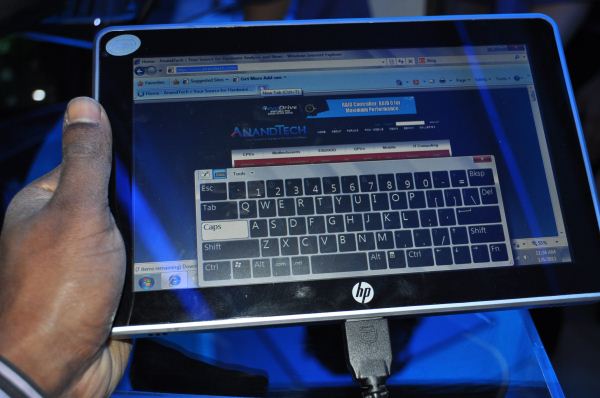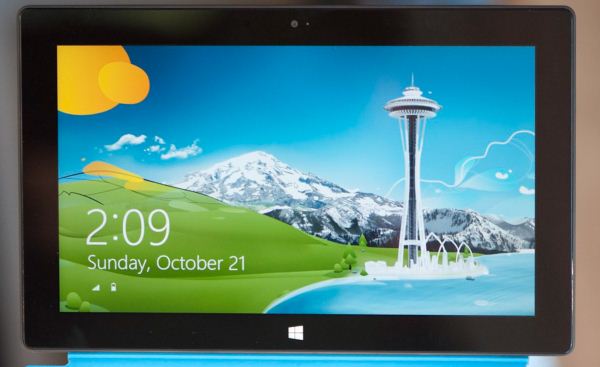The Windows RT Review
by Vivek Gowri & Anand Lal Shimpi on October 25, 2012 12:00 PM EST- Posted in
- Windows RT
- Operating Systems
- Microsoft
- Mobile
- Windows 8
- Tablets
Meet Windows RT
Microsoft’s first serious foray into tablets came just after the turn of the new millenium, with Bill Gates demonstrating the first tablet PC prototype onstage at Comdex in the autumn of 2000. From there, OEMs started releasing tablets based on Windows XP Tablet PC Edition in 2002, with a full range of pen-enabled slates and convertibles releasing over the next few years. In addition to oftentimes prohibitive cost, each had its own set of drawbacks. Convertibles tended to be quite bulky compared to their notebook counterparts (the ThinkPad X-series being a notable exception), while slates were rather difficult to use - a symptom of shoehorning a desktop operating system into a purely touch-centric form factor.
Fast forward a decade, to the beginning of 2010. After a number of conceptual non-starters in the tablet PC space - building tablet PC support into all editions of Windows Vista and 7 (other than Basic/Home Starter), the entire Origami class of devices - Microsoft’s touchscreen devices were floundering. The iPad had been announced to mixed reaction but an extremely high level of anticipation. Microsoft and HP countered with the Slate 500, an Atom-based device shown off at CES 2010 with solid state storage and Windows 7 in roughly the same form factor as Apple’s iPhone OS-based ARM tablet. With speculation pointing to a pricetag of just $549, the Slate appeared to be the most viable hope Microsoft had in trying to make mainstream headway with the tablet PC concept. But shortly after the iPad shipped in April 2010, rumors of the Slate’s demise started to circulate, and after a six month delay, the Slate 500 started shipping as an enterprise-only product in December of that year for $799. HP’s acquisition of Palm (RIP) definitely played a role in the sidelining of the Slate, but more importantly, it essentially spelled the end for the tablet PC. This was news that was perhaps known already, but the Slate saga officially pulled the plug on Microsoft’s original idea of what a tablet was.
The problem was two parts software, one part hardware. Microsoft had developed a very interesting touch-oriented user interface for its handhelds, so at least one part of the equation was relatively straightforward. The hardware issue came down to this: the iOS and Android tablets succeeding in the market ran off ARM system-on-chips, which resulted in slim, power-efficient tablets that had idle times stretching for days. At the time, there was just nothing in terms of x86 hardware that could compete with that in low-power device realm (Clover Trail and Haswell, of course, change this part of the story considerably). The other question? How to converge the touch-centric UI with the classic desktop environment that had been the corner of Windows dating all the way back to 95.
Meet Windows RT. It’s Microsoft’s first major foray into the modern tablet market, the shipping version of Windows-on-ARM, and it’s one of Microsoft’s most important product launches ever. Windows 8 shares the same touch-friendly user interface, but the ARM silicon makes RT an almost entirely tablet-centric operating system, the first for Microsoft. Combined with the focus on premium hardware experiences, this is Redmond’s most serious push to be competitive with the iOS and Androids of the world. How does it fare? Keep reading.












233 Comments
View All Comments
faizoff - Thursday, October 25, 2012 - link
I just got done fully reading the Surface review. This should be a good one as well.EnzoFX - Thursday, October 25, 2012 - link
Sure was.Win RT is promising, it really is all about the tablet experience. Which is why I don't understand their decision to have the desktop and access to all the underpinnings. Surely a real power user won't limit themseles to RT, and simply go for the 8?
Is it to have developers make desktop-centric arm based apps? That seems counter intuitive. They could have easily made Office into a Modern UI style app. What is the real point in the end? Maybe I missed something.
My only other criticism is little things that sometimes show me lack of focus. 4 edge swipes? Couldn't they have streamlined that down to 2 max? and why must some things just be too hidden, or even not even accessible via the Modern UI?
Leonick - Thursday, October 25, 2012 - link
"Is it to have developers make desktop-centric arm based apps? That seems counter intuitive. They could have easily made Office into a Modern UI style app. What is the real point in the end? Maybe I missed something."Considering developers can't make desktop apps for Windows RT that isnt it...
I'm guessing MS was simply too lazy or "didn't have time" to build a metro equivalent for everything for Windows 8 and will likely continue the work for the next release, as long as the desktop is still there they could also put Office even on RT with minimal effort.
But yea, it's odd.
blanarahul - Thursday, October 25, 2012 - link
I am really interested in seeing Windows RT with Quad Core Qualcomm S4 Pro. 40% faster CPU, 100% faster GPU than Tegra 3. Power friendly. It should make RT shine even more. In fact I believe that the APQ8064 was made for Windows RT.karasaj - Friday, October 26, 2012 - link
This is exactly what I was thinking and hoping Surface would have come out with.Krysto - Thursday, October 25, 2012 - link
"The odds of that situation arising seem relatively low, so my bet is that the strength of the ecosystem will be a non-issue a month from now."Really? A month from now? Can I hold you to that? It will be at least a year before Metro store gets even tens of thousands of apps. I think you've been reading too many Microsoft PR statements ready, and it's starting to influence your objectivity, and now you're just using Microsoft's words as your own - while thinking to yourself that they are your own words.
StevoLincolnite - Thursday, October 25, 2012 - link
Right... Because you're really going to browse and install 10's of thousands of Apps. (With the majority being fart of flashlight apps anyway.)munsie - Thursday, October 25, 2012 - link
So when it was Windows vs Macs back in the 90s, the argument was always that there were more apps on Windows, why would you buy anything else? But now that there are more iOS apps vs Win RT apps, it's that most of them are "fart of flashflight apps"?More apps isn't just more junky apps -- it means that more experimentation/innovation is happening as well. It means that there are apps being built for the long tail, not just the mass market appeal. Think about apps targeting very specific users, like doctors, lawyers, engineers, etc. These apps aren't the ones you see at the top of the charts, but are the ones that sell platforms.
Microsoft more than any other company should understand what Apple has accomplished with the iOS App Store.
andrewaggb - Thursday, October 25, 2012 - link
Yes and no though. Developer tools are much better than they were in the 90's.Many of these apps are already cross platform with ios and andriod, and many others already have windows versions or silverlight/wp8/xbox 360 versions that can be ported much easier.
Many of the popular dev tools used by smaller/indie developers already support exporting to different platforms, so if they don't support windows 8 yet, they will soon enough.
Plus Visual Studio is great.
Not to say Apple's accomplishments aren't amazing, they are. Nobody could have envisioned the success they've had in such a short time.
Apps will come. There's no money to be made right now anyways, nobody has devices, it'll all sort itself out in a few months. I think 1 month is optimistic, but within 6 months the apps will be there.
StormyParis - Thursday, October 25, 2012 - link
Well, the 90's argument was "1- why pay more 2- for slower, less expandable hardware that 3- is missing some key apps or even whole categories of apps and 4- is fading", so really, a series of issues.In the present case we get , 1- why pay the same or less 2- for slower, but a lot more expendable hardware that 3- has a killer app, though it's missing many key apps and all of the non-key ones but 4- will probably surge.
BTW... Google "75% Of Apple's App Store Is Ignored by Consumers" for a fun fact, if it is indeed true.